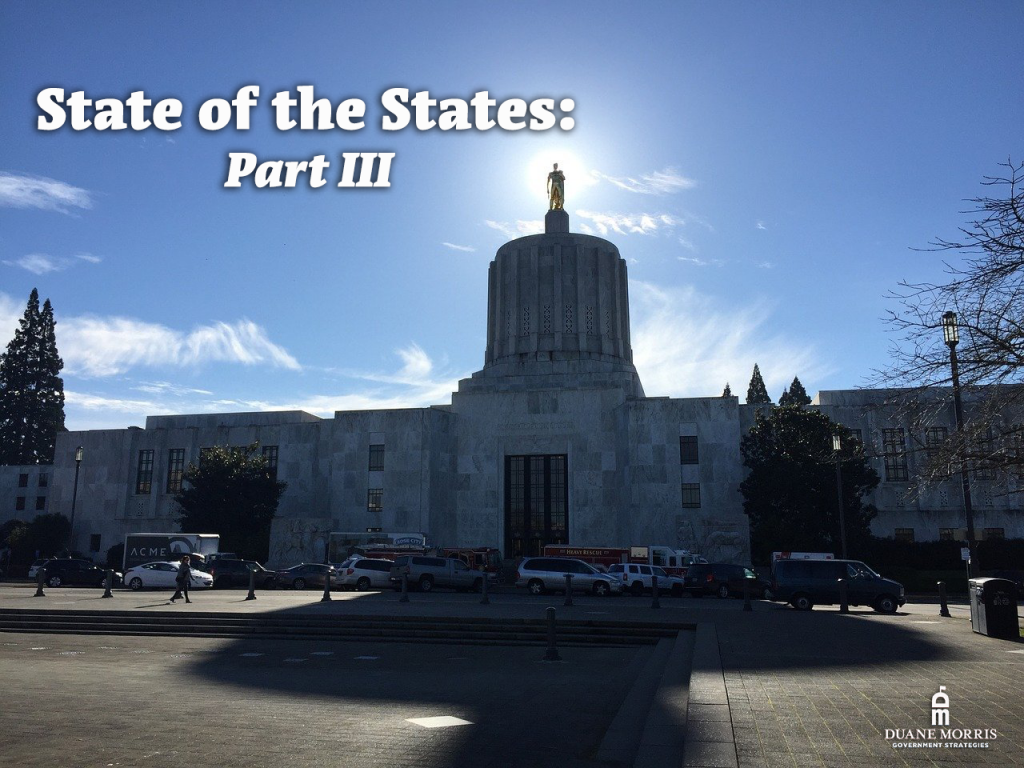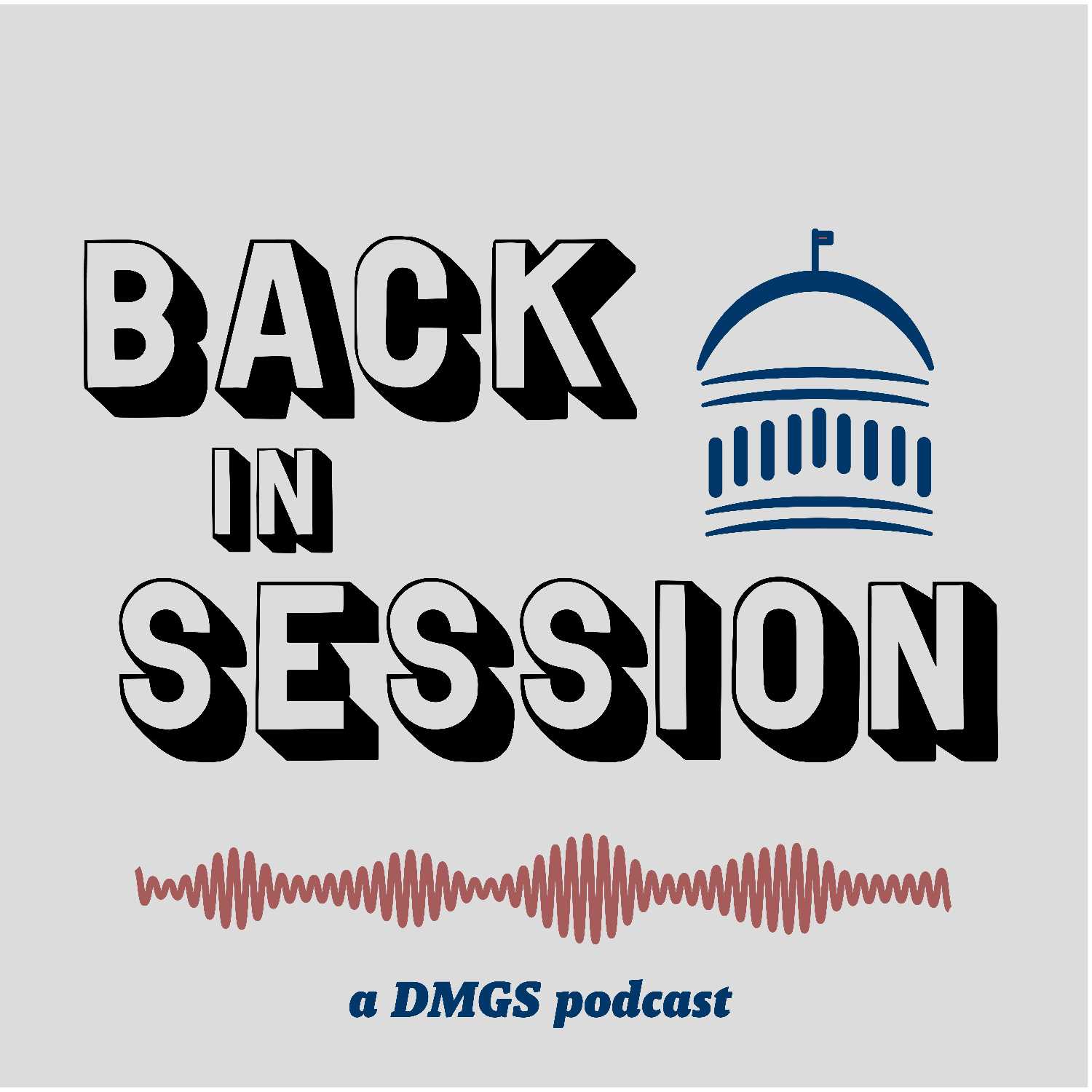As discussed in our previous State of the States updates (Part I and Part II), governors around the country are outlining their legislative and executive priorities as lawmakers begin their 2022 legislative sessions.
In Part III of our State of the States series, we look at Illinois, Maryland, Oregon, and Tennessee.
Illinois: Governor Pritzker’s Budget Proposal
Governor JB Pritzker delivered his budget proposal last week that includes $1 billion in one-time relief for grocery, gas, and property taxes, in addition to tripling the state’s Rainy Day Fund.
Highlights of the governor’s budget proposal include:
- $475 million in property tax rebates for families;
- $360 million in relief by freezing the state’s tax on groceries;
- $135 million in relief by freezing the previously planned increase in the gas tax;
- $500 million to the Pension Stabilization Fund;
- Almost $900 million to the Rainy Day Fund for FY 22 and FY 23;
- $350 million increase for Evidence Based Funding for K-12 schools;
- $96 million increase for transportation and special education;
- $54 million to increase Early Childhood Education;
- Increased funding for minority teacher scholarships;
- Waives licensing fees for nearly 470,000 frontline healthcare workers;
- $180 million to preserve and expand the healthcare workforce through Medicaid providers, focusing on underserved and rural areas in the state;
- $140 million to mental health care providers through rate enhancements;
- One year waiver of retail liquor license fees to help aid restaurants, bars, and liquor license holders;
- $38 million for Employer Training and Investment Program to assist in workforce and employee training efforts;
- $5 million to develop minority entrepreneurship programs and support small, minority-owned businesses;
- $35 million in new capital appropriates to Rebuild Main Streets and Downtown Commercial Corridors;
- Over $800 million for violence prevention programs;
- Funding for 300 new state troopers (largest single investment in state history);
- $50 million increase directly from cannabis revenues to support communities harmed by violence, excessive incarceration, and economic disinvestment; and
- $2 billion for services for individuals with developmental disabilities.
Maryland: Governor Hogan’s Eighth & Final SotS Address
Governor Larry Hogan delivered his eighth and final State of the State address last week.
As outlined in the address, Hogan’s legislative priorities include eliminating the state’s tax on retirees’ income, incentivizing business growth, and enacting stringent criminal justice policy. Hogan’s Retirement Tax Elimination Act would specifically eliminate 100% of state retirement taxes in the state and provide $4 billion in relief to retirees. Hogan also referenced a desire to eliminate filing fees for small businesses that submit their annual reports online, providing tax incentives to new and existing manufacturers that locate or expand in Maryland, and a COVID-19 economic recovery initiative that aims to provide financial assistance to revitalize vacant retail and commercial space.
One of Hogan’s other priorities included a “Re-Fund the Police” effort announced in October 2021. Hogan pledged to dedicate $150 million in funding for law enforcement and crime response programs.
While Hogan called for bipartisanship during his last year in office, he also criticized lawmakers for not taking up the redistricting proposals drawn by the Maryland Citizens Redistricting Commission, which never advanced out of legislative committees.
Oregon: Governor Brown’s Final State of the State Address
Last week, Governor Kate Brown delivered her final State of the State address. Governor Brown highlighted her priorities focused on helping working families, workforce development and career training, affordable housing, childcare, and more.
Looking back at her tenure as governor, Brown highlighted that graduation rates have increased for kids by 8% since she took office, record investments in education, a 16-year decrease in the number of children in foster care, the state’s largest transportation package was passed, and a comprehensive reproductive health package was passed.
Brown’s priorities, as indicated in her address, include:
- $200 million for Future Ready Oregon, to help address job training with a focus on key Oregon industries in need of skilled workers;
- $400 million for affordable housing;
- $100 million for child care; and
- Continuing to invest in preparing for, responding to, and recovering from climate-related disasters.
Tennessee: Governor Lee’s Fourth Address to Lawmakers
Governor Bill Lee delivered his fourth State of the State address to lawmakers at the end of January. Lee highlighted his priorities, including the details of his proposed $52.6 billion budget. There are over $8 billion in new allocations. Further, 41 cents of every dollar is allocated to education, with 24 cents to health and social services and 9 cents to law, safety, and corrections.
Some of Governor Lee’s budget proposal highlights include:
- $750 million recurring increase for a new K-12 education funding formula;
- $2.5 million to expand the Future Workforce Initiative;
- $124.7 million to provide an increase into the teacher salary pool’
- $25.5 million in recurring funding to continue summer learning camps;
- $16 million in recurring and $16 million in nonrecurring funding for the Charter Schools Facility Fund;
- $90 million to fully-fund the outcomes-based formula to enable a 0% tuition increase;
- $200 million for TCAT infrastructure investments to help double the skilled workforce by 2026;
- $250 million in infrastructure improvements at Tennessee State University;
- 4% salary pool increase for higher education employees;
- Funding to add 100 Highway Patrol Troopers, 20 TN Bureau of Investigation Agents, and 25 Tennessee Bureau of Investigation Forensic Science Personnel;
- $355.6 million in a Multi-Agency Law Enforcement Training Academy;
- $66 million for TN Law Enforcement hiring, training, and recruitment;
- $82 million to reimburse public hospitals for uncompensated care;
- $26 million in Rural Opportunity Grants;
- $25.5 million for adult dental benefits for 610,000 Tennessee residents eligible for TennCare;
- $18.6 million to attract over 150 new primary care residents;
- $619 million to accelerate projects listed in the IMPROVE Act and invest in transportation projects to ensure economic opportunity; and
- $103 million for the FastTrack program.
Other priorities mentioned by Lee include proposing a new law to ensure parents know what materials are available to students in libraries, new legislation to make computer science and coding available to every high schooler in the state, expanding civics education in K-12, reducing employee headcount at government departments by 5% without layoffs, and developing the State of TN Excess Property Strategy to eliminate excess state real property and reduce the costs associated with owning unneeded real estate.
Latest News
Photo credit: iStock.com/sommart In 2025, state governments across the U.S. are advancing initiatives to improve administrative efficiency and modernize civil service, adopting tailored strategies to better serve residents. Recognizing the importance of adaptability, innovation, and [...]
Photo credit: iStock.com/BackyardProduction Governor Josh Shapiro delivered his 2025-26 budget address, outlining economic initiatives, public safety measures, infrastructure improvements, and education funding. His speech emphasized continued investment in key sectors to strengthen Pennsylvania’s [...]
As legislative sessions kick off across the country, advocacy professionals must navigate diverse political landscapes, shifting priorities, and fast-moving policy developments. In this episode of Back in Session, hosts Ryan Stevens and Ryan DeMara sit [...]
Photo credit: iStock.com/hapabapa As the year draws to a close, state legislatures across the country are gearing up for their upcoming sessions in 2025. A critical aspect of this preparation is state legislative prefiling, a [...]







Stay In Touch